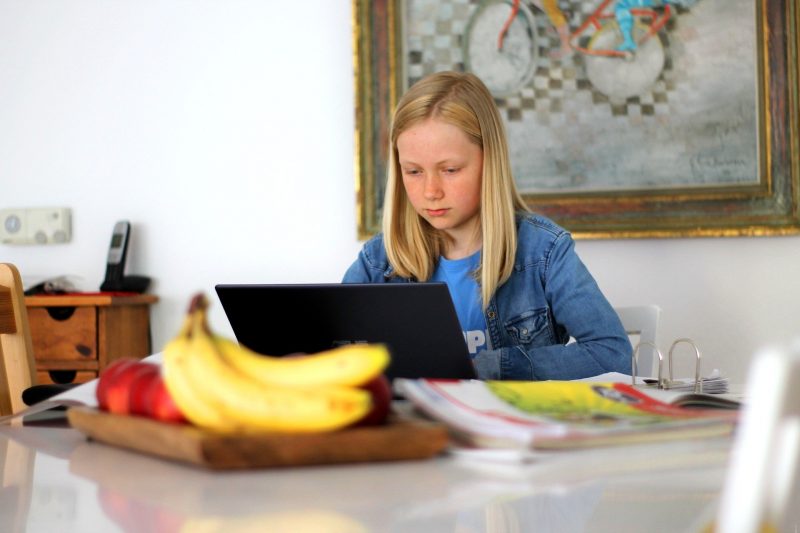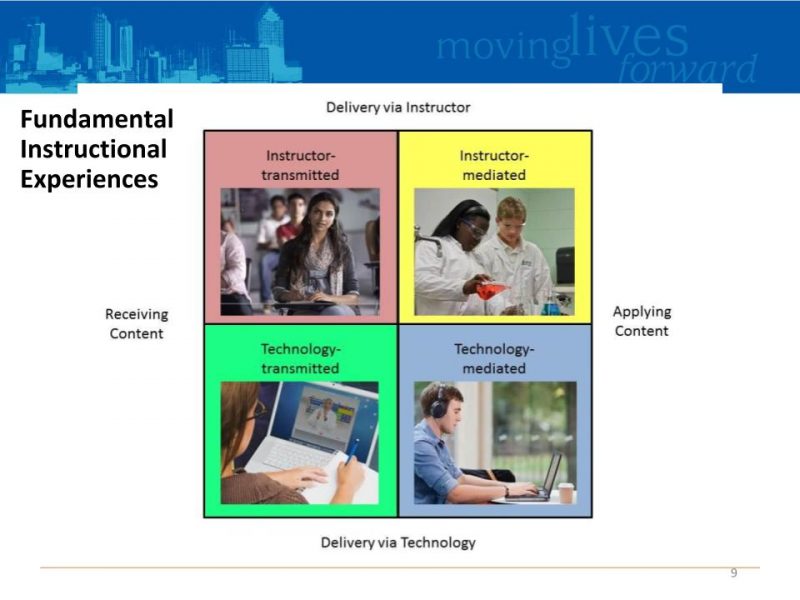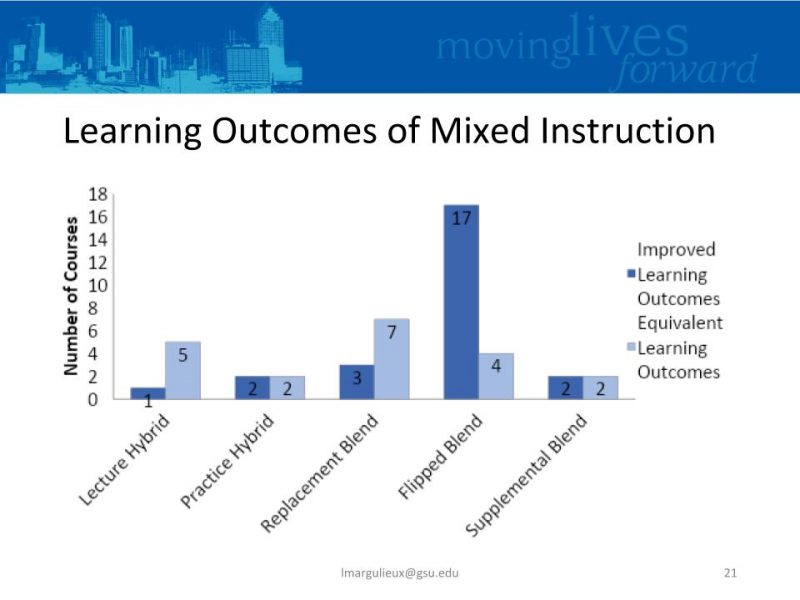As many educators across the world are currently faced with implementing some form of remote teaching during school closures, we thought this topic was ideal for the very first of our seminar series about computing education research.

Research into online learning and remote teaching
At the Raspberry Pi Foundation, we are hosting a free online seminar every second Tuesday to explore a wide variety of topics in the area of digital and computing education. Last Tuesday we were delighted to welcome Dr Lauren Margulieux, Assistant Professor of Learning Sciences at Georgia State University, USA. She shared her findings about different remote teaching approaches and practical tips for educators in the current crisis.

Lauren’s research interests are in educational technology and online learning, particularly for computing education. She focuses on designing instructions in a way that supports online students who do not necessarily have immediate access to a teacher or instructor to ask questions or overcome problem-solving impasses.
A vocabulary for online and blended learning
In non-pandemic situations, online instruction comes in many forms to serve many purposes, both in higher education and in K-12 (primary and secondary school). Much research has been carried out in how online learning can be used for successful learning outcomes, and in particular, how it can be blended with face-to-face (hybrid learning) to maximise the impact of both contexts.

In her seminar talk, Lauren helped us to understand the different ways in which online learning can take place, by sharing with us vocabulary to better describe different ways of learning with and through technology.
Lauren presented a taxonomy for classifying types of online and blended teaching and learning in two dimensions (shown in the image below). These are delivery type (technology or instructor), and whether content is received by learners, or actually being applied in the learning experience.

In Lauren’s words: “The taxonomy represents the four things that we control as instructors. We can’t control whether our students talk to each other or email each other, or ask each other questions […], therefore this taxonomy gives us a tool for defining how we design our classes.”
This taxonomy illustrates that there are a number of different ways in which the four types of instruction — instructor-transmitted, instructor-mediated, technology-transmitted, and technology-mediated — can be combined in a learning experience that uses both online and face-to-face elements.

Using her taxonomy in an examination (meta-analysis) of 49 studies relating to computer science teaching in higher education, Lauren found a range of different ways of mixing instruction, which are shown in the graph below.
- Lecture hybrid means that the teaching is all delivered by the teacher, partly face-to-face and partly online.
- Practice hybrid means that the learning is done through application of content and receiving feedback, which happens partly face-to-face or synchronously and partly online or asynchronously.
- Replacement blend refers to instruction where lecture and practice takes place in a classroom and part of both is replaced with an online element.
- Flipped blend instruction is where the content is transmitted through the use of technology, and the application of the learning is supported through an instructor. Again, the latter element can also take place online, but it is synchronous rather than asynchronous — as is the case in our current context.
- Supplemental blend learning refers to instruction where content is delivered face-to-face, and then practice and application of content, together with feedback, takes place online — basically the opposite of the flipped blend approach.

Lauren’s examination found that the flipped blend approach was most likely to demonstrate improved learning outcomes. This is a useful finding for the many schools (and universities) that are experimenting with a range of different approaches to remote teaching.
Another finding of Lauren’s study was that approaches that involve the giving of feedback promoted improved learning. This has also been found in studies of assessment for learning, most notably by Black and Wiliam. As Lauren pointed out, the implication is that the reason blended and flipped learning approaches are the most impactful is that they include face-to-face or synchronous time for the educator to discuss learning with the students, including giving feedback.
Lauren’s tips for remote teaching
Of course we currently find ourselves in the midst of school closures across the world, so our only option in these circumstances is to teach online. In her seminar talk, Lauren also included some tips from her own experience to help educators trying to support their students during the current crisis:
- Align learning objectives, instruction, activities, assignments, and assessments.
- Use good equipment: headphones to avoid echo and a good microphone to improve clarity and reduce background noise.
- Be consistent in disseminating information, as there is a higher barrier to asking questions.
- Highlight important points verbally and visually.
- Create ways for students to talk with each other, through discussions, breakout rooms, opportunities to talk when you aren’t present, etc.
- Use video when possible while talking with your students.
Give feedback frequently, even if only very brief.
Although Lauren’s experience is primarily from higher education (post-18), this advice is also useful for K-12 educators.
What about digital equity and inclusion?
All our seminars include an opportunity to break out into small discussion groups, followed by an opportunity to ask questions of the speaker. We had an animated follow-up discussion with Lauren, with many questions focused on issues of representation and inclusion. Some questions related to the digital divide and how we could support learners who didn’t have access to the technology they need. There were also questions from breakout groups about the participation of groups that are typically under-represented in computing education in online learning experiences, and accessibility for those with special educational needs and disabilities (SEND). While there is more work needed in this area, there’s also no one-size-fits-all approach to working with students with special needs, whether that’s due to SEND or to material resources (e.g. access to technology). What works for one student based on their needs might be entirely ineffective for others. Overall, the group concluded that there was a need for much more research in these areas, particularly at K-12 level.

Much anxiety has been expressed in the media, and more formally through bodies such as the World Economic Forum and UNESCO, about the potential long-lasting educational impact of the current period of school closures on disadvantaged students and communities. Research into the most inclusive way of supporting students through remote teaching will help here, as will the efforts of governments, charities, and philanthropists to provide access to technology to learners in need.
At the Raspberry Pi Foundation, we offer lots of free resources for students, educators, and parents to help them engage with computing education during the current school closures and beyond.
How should the education community move forward?
Lauren’s seminar made it clear to me that she was able to draw on decades of research studies into online and hybrid learning, and that we should take lessons from these before jumping to conclusions about the future. In both higher education (tertiary, university) and K-12 (primary, secondary) education contexts, we do not yet know the educational impact of the teaching experiments we have found ourselves engaging in at short notice. As Charles Hodges and colleagues wrote recently in Educause, what we are currently engaging in can only really be described as emergency remote teaching, which stands in stark contrast to planned online learning that is designed much more carefully with pedagogy, assessment, and equity in mind. We should ensure we learn lessons from the online learning research community rather than making it up as we go along.

Today many writers are reflecting on the educational climate we find ourselves in and on how it will impact educational policy and decision-making in the future. For example, an article from the Brookings Institution suggests that the experiences of home teaching and learning that we’ve had in the last couple of months may lead to both an increased use of online tools at home, an increase in home schooling, and a move towards competency-based learning. An article by Jo Johnson (President’s Professorial Fellow at King’s College London) on the impact of the pandemic on higher education, suggests that traditional universities will suffer financially due to a loss of income from international students less likely to travel to universities in the UK, USA, and Australia, but that the crisis will accelerate take-up of online, distance-learning, and blended courses for far-sighted and well-organised institutions that are ready to embrace this opportunity, in sum broadening participation and reducing elitism. We all need to be ready and open to the ways in which online and hybrid learning may change the academic world as we know it.
Next up in our seminar series
If you missed this seminar, you can find Lauren’s presentation slides and a recording of her talk on our seminars page.
Next Tuesday, 19 May at 17:00–18:00 BST, we will welcome Juan David Rodríguez from the Instituto Nacional de Tecnologías Educativas y de Formación del Profesorado (INTEF) in Spain. His seminar talk will be about learning AI at school, and about a new tool called LearningML. To join the seminar, simply sign up with your name and email address and we’ll email the link and instructions. If you attended Lauren’s seminar, the link remains the same.
Website: LINK
Schreibe einen Kommentar
Du musst angemeldet sein, um einen Kommentar abzugeben.